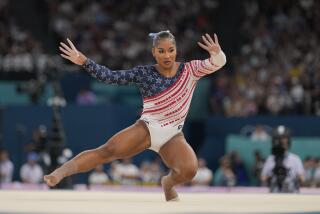Camping out for the arena seats
- Share via
Highlights from The Times’ Ticket to Beijing blog (at latimes.com/olympics):
It’s 4 p.m. and I just got to the arena for Sunday night’s big game between the U.S. and China.
I’m a little early, seeing as how the game starts at 10:15 p.m. Of course, I have one colleague who got here at 9 a.m. for the first of the day’s eight games.
We are all a little concerned about getting seats. With all the talk about this being the most-watched game ever, with an audience in the hundreds of millions, we’re a little concerned that a million or so Chinese journalists will turn up.
I get here just in time to see the end of Game No. 3 between -- between -- it was about four hours ago, but I’m sure I can remember -- oh yes, Spain was one and the other was -- was -- Greece! (Confession: I looked it up.)
Spain won easily, which raises one question: Greece beat the U.S. at the world championships in 2006?
Then Lithuania played Argentina. That was great since both of those teams can play.
Unfortunately for the Argentines, they didn’t start playing until they were 12 points down in the fourth quarter. Led by Manu Ginobili, they then tied the score, only to lose in the last seconds on a Linas Kleiza three-pointer.
Then came Australia vs. Croatia.
You have to like any team that has a 3-foot-high inflatable kangaroo they call “Boomer” sitting next to its bench.
It’s 9:15 p.m. Only an hour to wait. It’s now standing room only for press people who are just getting here now and jockeying for the best positions behind the press box.
This just in: Croatia 97, Australia 82.
At 9:45 p.m., overflow press is three people deep in back of the press box. A fight almost breaks out between an American who had his daughter with him and an Asian who was reclaiming his spot.
Here come the Americans! Here come the Chinese!
Game time!
I just hope I can stay awake long enough to file.
-- Mark Heisler
--
Karolyi gets his hackles up
Bela Karolyi is doing NBC television commentary for gymnastics, and even as he cheered on the U.S. women, he also kept simmering over what he believes is China’s “blatant” flouting of the sport’s age rules.
According to the international federation rules, Olympic and world championship competitors must turn 16 during the year they participate. The two Chinese women who have qualified for the individual all-around -- Yang Yilin and Jiang Yuyuan -- were named in several news reports as having birth dates on provincial registration lists in 1993 and 1994, respectively. According to passport information submitted to become Olympics-eligible, they are now 16.
After China outscored the U.S. in team qualifications, Karolyi said the Chinese team is using “half people” and that China is arrogant. “These people think we are stupid,” Karolyi said. International federation officials have reiterated over the last two weeks that it is not their job to investigate “Internet” reports or challenge the passport information submitted by a federation.
“We are in the business of gymnastics,” Karolyi said. “We know what a kid of 14 or 15 or 16 looks like. What kind of slap in the face is this? They are 12, 14 years old and they get lined up and the government backs them and the federation runs away. There is an age limit and it can’t be controlled.”
-- Diane Pucin
--
What lengths would you go to?
This is not something I’d do for luck, but then I wouldn’t go into weightlifting either.
Chanpim Kantatian from Thailand was a little worried that she might not make her country’s Olympic team. So last year, she went to see a fortuneteller, who told her to change her name.
Headline writers in Bangkok might have suggested something like “Madonna.”
Kantatian chose: Prapawadee Jaroenrattanatarakoon.
It seems to have worked. She won the gold medal Sunday in the 53-kilogram class.
-- Randy Harvey
More to Read
Go beyond the scoreboard
Get the latest on L.A.'s teams in the daily Sports Report newsletter.
You may occasionally receive promotional content from the Los Angeles Times.






